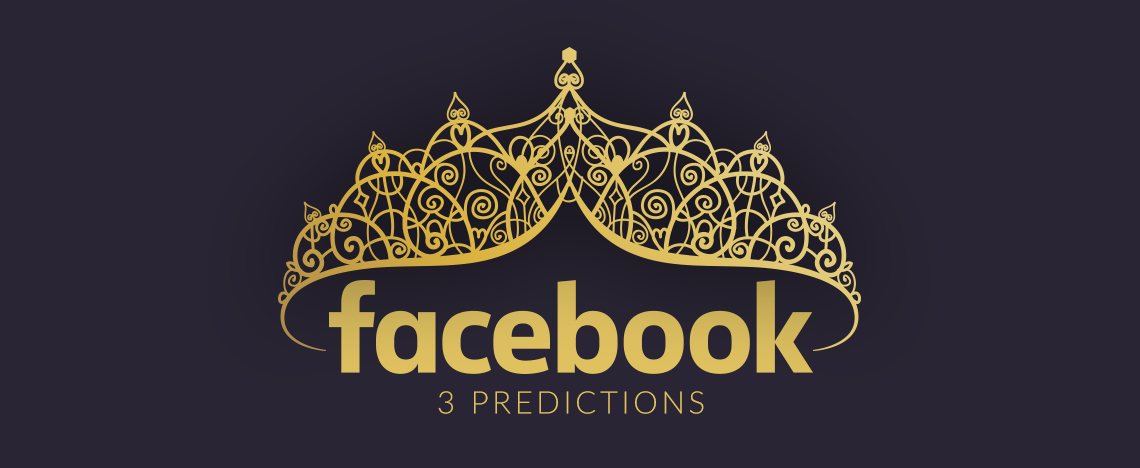
Facebook Trends: 3 Predictions From the 'FB Queen'

When it comes to predicting Facebook trends, there are few people who have gotten it right as often as Mari Smith.
The internationally known “Queen of Facebook” has been leading social media marketing strategies for more than a decade. Forbes has named her among the list of top social media influencers year after year, and she trains business leaders around the world to be more successful on the platform.
At this year’s INBOUND conference, Smith shared her top three Facebook trend predictions and offered sound advice to help marketers get ahead of the changes.
3 Facebook Trends for 2020 and Beyond
1. Facebook Will Become A Private, Personal Message Platform
Earlier this year, following the Cambridge Analytica scandal and other privacy violations, Facebook announced a series of changes it said would improve privacy for users.
In addition to making the app more secure, Facebook founder and CEO Mark Zuckerberg said his vision includes moving to a more “privacy-focused communications platform.”
“Privacy gives people the freedom to be themselves and connect more naturally, which is why we build social networks,” he wrote in a statement in March. “Today we already see that private messaging, ephemeral stories, and small groups are by far the fastest growing areas of online communication. There are a number of reasons for this. Many people prefer the intimacy of communicating one-on-one or with just a few friends. People are more cautious of having a permanent record of what they've shared. And we all expect to be able to do things like payments privately and securely.”
Zuckerberg went on to explain the features he believes are essential to a privacy-focused platform, including:
- Private interactions
- Encryption
- Reducing permanence
- Safety
- Interoperability between all Facebook apps
- Secure data storage
Zuckerberg said he plans to make these changes over the next year and beyond.
Smith and other analysts have pointed out that Facebook appears to be moving toward a business model that’s similar to WeChat in China, where users can shop, book appointments, communicate with friends and even do their banking within a single app.
What This Means For Marketers: As Facebook trends shift toward private communications and marketers incorporate live chat and chatbots into their strategy, expect to see more nurturing happening within the Messenger app. Marketers will use Facebook Messenger to book demos, offer instant customer service and one day, potentially even accept payments.
Facebook Messenger messages convert three to five times better than Facebook desktop ads, according to MobileMonkey CEO Larry Kim, who called Facebook Messenger chatbots "the No. 1 growth marketing channel for the next 5 to 10 years."
2. Facebook Groups Will Become More Important Than The Newsfeed
When Facebook first introduced its News Feed in 2006, it was a game-changer for the platform. Now, some believe the era of the News Feed could be coming to an end.
Facebook has been testing possible changes to the News Feed for years. First, it made significant changes to the News Feed to prioritize “meaningful content” over posts from brands, which effectively ended organic Facebook reach for businesses.
Last year, it tested creating two separate feeds for content from family and friends and business pages.
More recently, it has tested merging the Facebook News Feed and Stories into a single interface.
While the News Feed is becoming a less viable channel for brands (at least as a source of organic traffic), engagement in Facebook Groups is growing, Smith said.
She added we can expect to see Groups displayed more prominently in the new Facebook browser.
“It’s not about getting 1 million likes, but finding 1,000 true fans and building a community around that,” she said.
What This Means For Marketers: Marketers could have the ability to boost posts within Groups and create look-alike audiences based on groups. While this feature hasn’t been added yet, Smith and other leading social media consultants have speculated it could happen soon. What’s not clear yet is how the privacy settings for Groups could affect the visibility of ads.
3. Videos Will Dominate Facebook Content
Facebook recently launched a free on-demand video streaming platform, Facebook Watch. Like Netflix and other subscription-based services, it has plenty of original content. Unlike those services, Facebook Watch is free—but it’s filled with ads. That means there are plenty of opportunities for brands to gain visibility at a cost that may be more affordable than traditional ads.
The platform prioritizes viral content designed to drive discussion, rather than network shows.
It’s intended to create “shared experiences” and be distinctly different from watching YouTube videos, Smith said.
And the level of engagement so far looks promising. The most successful Facebook Watch show, Red Table Talk featuring Jada Pinkett Smith, her daughter and her mother, has an average viewing time of 20 minutes.
What This Means For Marketers: To be successful with Facebook video marketing in 2020 and beyond, marketers need to focus on quality over quantity. The "Queen of Facebook" recommends creating highly shareable native videos, rather than directing viewers to links that take them off the platform. They should consider hosting live events and inviting group members to “watch parties,” rather than traditional webinars.
How To Maximize Your Investment In Facebook Marketing
Facebook is still the No. 1 digital advertising platform, and that isn't likely to change anytime soon. However, with recent Facebook trends emphasizing greater privacy, personalization and engagement, marketers will almost certainly need to get more creative about how they interact with their audiences.
Simply throwing a few dollars behind static News Feed posts just won't cut it anymore.
What does work is what Smith calls the "Mari Method."
It's simple: Start with a great piece of content—ideally a video—and allow it to gather organic reach for a day or two. Once it's gaining some traction, promote it with paid advertising. Then use custom audiences to retarget people who watch the video. If you're launching a new product or hosting a webinar, you can also create a Facebook event and invite your most engaged prospects (for instance, anyone who has visited certain product pages, downloaded a relevant resource or opened a series of recent emails).
While you're at it, try engaging with prospects using features of Facebook you haven't used before, like Messenger, Events or Groups. In the years to come, the marketers who will be most successful on Facebook are those who continually adapt their strategy.




